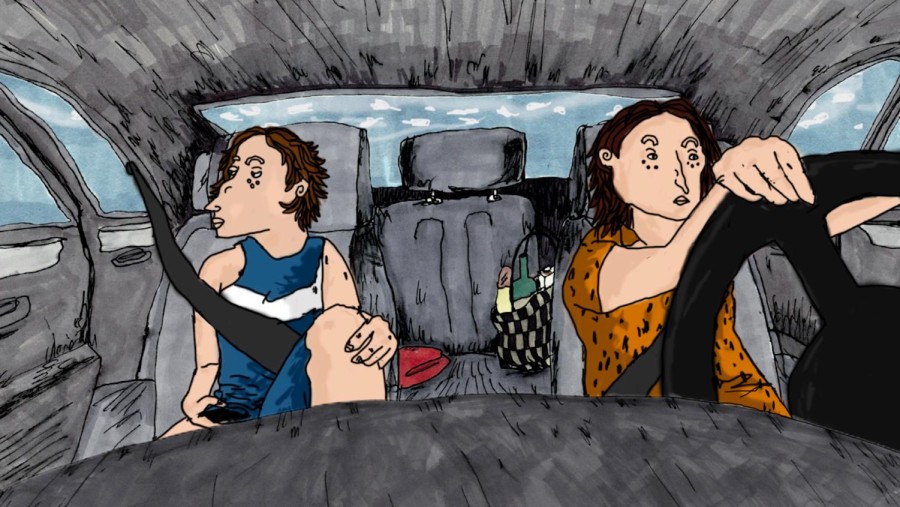Review: ‘Shorts Program I’ shows the youthful side of cinema with an assemblage of global coming-of-age stories
New Directors/New Films 2022’s first program of short films collects a diverse sampling of stories from around the globe and touches on the pains of growing up in the modern world. “Shorts Program I” plays on Tuesday, April 26, at Film at Lincoln Center.
Directed by Sara Szymańska, the animated “Five Minutes Older” is part of Film at Lincoln Center’s New Directors/New Films 2022. The film is featured in the “Shorts Program I”, which focuses on coming-of-age narratives. (Image courtesy of Film at Lincoln Center Press)
April 26, 2022
New Directors/New Films collects the most exciting voices of up-and-coming filmmaking. Although the festival’s feature-length titles, such as “Los Conductos” or “We’re All Going to the World’s Fair,” often get the most attention, the festival’s short film programs do a marvelous job of collecting brief feats in innovative filmmaking. With its focus on coming-of-age themes, this year’s “Shorts Program I” patches together stories from around the globe to survey universal experiences related to growing up in vastly different social environments.
Here is a brief overview of the short films playing as part of “Shorts Program I” at Film at Lincoln Center.
“Five Minutes Older” (directed by Sara Szymańska)
“Five Minutes Older” is a funny animated short about bickering twins. The film’s childlike animation style works to give it a human charm that makes its already well-written characters all the more relatable. As the two sisters fight over who gets control of the aux, who’s the better driver, and how they don’t see each other enough anymore, Szymańska produces a fast-paced treatise on sisterly love wrought with so many nuances, you often forget you’re watching an animated film. In its exploration of sisterhood, “Five Minutes Later” unravels a short, sweet and tender story jam-packed with emotional ups and downs that make for a riveting and endearing watch.
“North Pole” (directed by Marija Apcevska)
Marija Apcevska’s “North Pole” is a tightly packed, micro-scale story about a young girl, Margo (Antonija Belazelkoska), dealing with her sexuality and pressure from her peers. The understated character study comes off as a refreshingly smart take on the coming-of-age genre, distilling the pangs of adolescent alienation into a series of brief vignettes that perfectly convey the suffocating sensation that accompanies teens trying to conform to the norms of high school. The lush, celluloid cinematography by Vladimir Samoilovski shines through here, making each image as icy as the film’s setting near the North Pole — and as the behavior of Margo’s so-called friends. In its study of teenage politics and heightened alienation at one of the geographic ends of humanity, “North Pole” manages to breathe new life into a time-worn genre.
“Suncatcher” (directed by Kim Torres)
Kim Torres’ “Suncatcher” — or “Atrapaluz” in the original Spanish — explores the influence of cyberpunk anime culture on young, aimless Latin Americans. Using a dreamy score and pairing it with surreal visuals, “Suncatcher” comes off as a tender study of an outcast teen, Lila (Simon Dalzell), and feels like the Central American relative of “We’re All Going to the World’s Fair.” As it goes on, “Suncatcher” gets more bizarre. It plays with the roots of magical realism embedded in the Latin American cultural consciousness and supplants them by bringing the genre to the present where its fantastical elements clash against the strangeness of cyberpunk culture.
“Astel” (directed by Ramata-Toulaye Sy)
Ramata-Toulaye Sy’s “Astel” is a slow-moving portrait of a young, female cattle-whisperer in the rural Fouta region of northern Senegal. Following the titular Astel’s daily activities like clockwork, the director skillfully records how gender roles are enforced in society through repeated actions. The result is a small, albeit insightful, work of sociological filmmaking that unearths the embeddedness of certain patriarchal patterns in Senegalese society. These patterns prevent Astel from partaking in activities that she loves by forcing her to oppositely spend time with other women preparing food or going on long walks. With its long shots, vivid colors and stunning cinematography, “Astel” creates a lasting impact that transcends its short runtime.
“Further and Further Away” (directed by Polen Ly)
“Further and Further Away” is an original look into the lives of two siblings struggling in Cambodia. Director Polen Ly pairs an emotional narrative with strong visuals, creating a meditation on the act of growing up and saying farewell to the places you grew up in. But for all its stunning cinematography, Ly’s film often veers into long, uneventful shots that overrun their intrigue and end up lulling the viewer. The end result is a patchy stream of stunning yet saddening forgettable images that make for a stirring slog of a short film.
Contact Nicolas Pedrero-Setzer at [email protected].

























































































































































